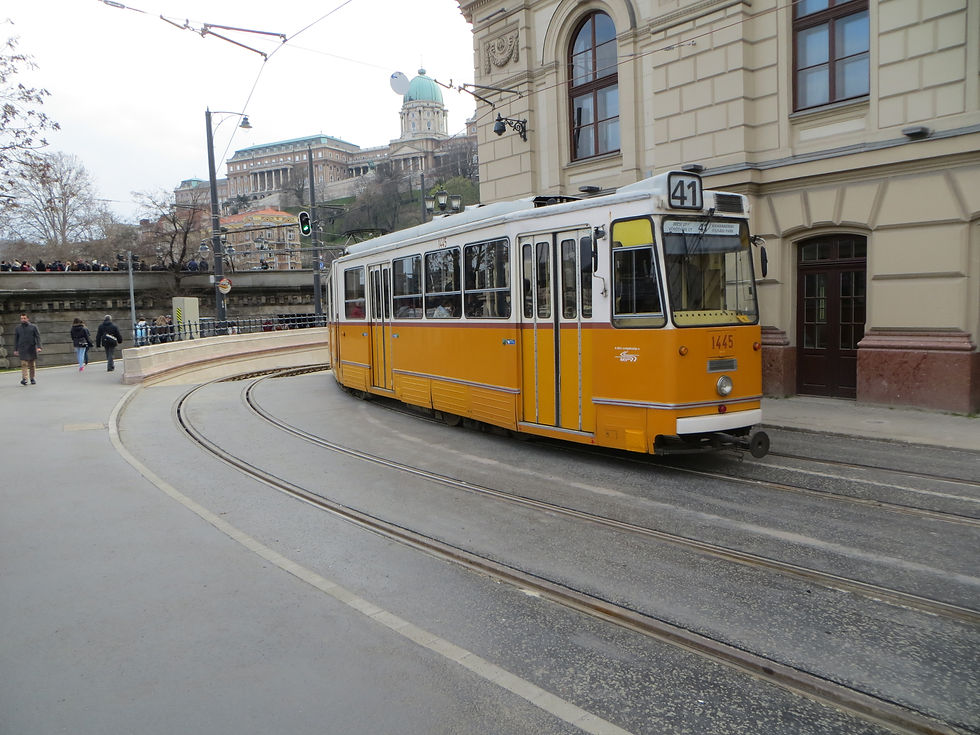Trams, Trolleybuses and TramTrains are now in pole position (with electric cars)
- John Woodman

- Jul 27, 2017
- 4 min read
The Government's announcement of a total ban on the sale of NEW diesel and petrol cars on or by 2040 is a marker showing that the dominance of the garage pumps now has a shelf-life with end in sight. Pollution in UK town and city centres is a recognisable
problem, perhaps not in Blackpool where sea breezes tend to waft emissions away, but for the likes of Manchester, London, Liverpool, Leeds and Birmingham, it is no joke. Walk along Oxford Street on any day of the week and soak in the diesel emissions from
buses and taxis -(no private cars allowed) - and you will immediately get the message.
Ironically Leeds was the one UK city which was to have seen electric trolleybuses being introduced under the Labour Government as well as trams in Liverpool. Whatever happened to those far flung political promises? Electric powered vehicles are now very much dominating automotive and transportation planners. The need for hundred times the number of existing electric power charging points (for cars) is evident, especially when you see the former petrol stations of yesterday now turned into mini malls, cafes and much else without seemingly any restrictions from Councils, local and otherwise. When you consider the rash of Aldis, Lidls and other discount food retailers popping up here there and everywhere, one needs to ask just how much food can be consumed in this country? Town centres are fast becoming grazing grounds for the fat and just plain lazy population, with cafes and fast food outlets (subway anyone?) taking charge of feeding this nation. One consequence of this self indulgence is the fleet of mobility scooters (or whatever they are called these days) filling out pavements and usually in the charge of individuals who quite evidently could benefit from actually walking around to help lose weight, among other healthy benefits. Blackpool would seem to be the mobility scooter capital of the northwest given the prevalence of these by now dangerous intrusions on public space.

A London trolleybus - frozen in time in the LT Museum at Covent Garden. Once regarded as the panacea for tram replacement but then superseded by the bus (RT, RTW, RTL, RM, RML etc etc).
But back to the electric energy topic. Trams are definitely in - but come with expensive capital investment upfront and therefore unattractive to politicians, except in major urban centres (excluding London). The capital's TfL (Transport for London) leadership once held out credible plans for trams running from Shepherds Bush to Ealing and Hounslow and along the Oxford Street corridor eliminating the constant jostling queue of lumbering buses, all emitting dangerous particulates to imperil pedestrians and anyone living or working in proximity - including schools. A cross river tramline was envisaged (seriously) which would have linked Waterloo with Kings Cross and St Pancras (and Euston) stations; whilst various extensions to Croydon's existing tramway set up have been deferred, delayed and kicked into proverbial long grass over successive years. London never had any liking for trams after the 1920s (at least the political powers that were); whilst the public loved them despite traditional double deck types which were churned out in their hundreds (in Motherwell) - up to the 1930s for the capital's tram network. Nowadays its all imported metal composite designs expensively imported from our EU neighbours that represent the modern tram. Even Blackpool has had to make do with imports from Germany - or is it Austria? to carry millions along the promenade. A close scrutiny of their window glazing gives away their origins and country of manufacture.
There is no reason at all why the UK cannot sustain a tram and trolleybus design build resource, if the political will is there to see it through. Andy Burnham's challenge to the Department of Transport this week after its announcement of yet more billions to be thrown at a second Crossrail line for the capital - shows just how disconnected central government is with its voters up north. Although Manchester has little enough to complain about, given the massive expenditures on new (and imported) rolling stock for its Metrolink services, and sustained extensions to that system. One which seems to be subject to almost daily failures in points, power, or any combination thereof. Blackpool fortunately, with its primary off road operation, suffers much less in this respect, although it seems to run the noisiest trams in the entire country, with rattling noises underneath the fleet marking their passage up and down the seafront.
EUROPE'S LOVE AFFAIR WITH ELECTRIC TRAMS (AND TROLLEYBUSES)

Zurich Blue - immaculate system

Budapest yellow and white - now vastly upgraded cars from this earlier design

Paris is being ringed by tram services - this was the first at Bobigny with a 1980s model

Prague - trams everywhere - take a look at the street junction !
So perhaps the trolleybus may actually make its comeback after all. The future for electric powered urban transport in the UK is getting brighter by each Parliamentary session - or so it seems. For real lessons on how electric urban transport actually works best, one needs to take a trip to any European country and sample the quiet running tram systems which permeate the continent - with political and private sector encouragement. Oh and some great lessons in trolleybus operation as well....












